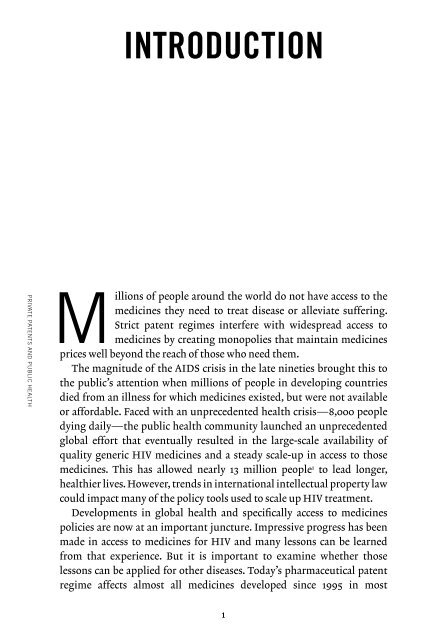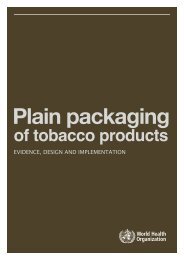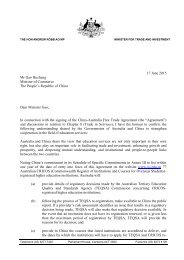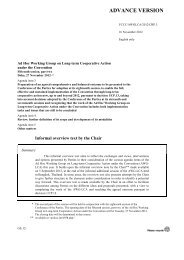- Page 1 and 2: “Ellen ’t Hoen is a towering fi
- Page 3 and 4: PRIVATE PATENTS AND PUBLIC HEALTH P
- Page 5 and 6: ACKNOWLEDGEMENTS PRIVATE PATENTS AN
- Page 7 and 8: PRIVATE PATENTS AND PUBLIC HEALTH 3
- Page 9 and 10: ANNEXES ANNEX 1 The General Council
- Page 11: I dedicate this book to the memory
- Page 15 and 16: PRIVATE PATENTS AND PUBLIC HEALTH b
- Page 17 and 18: PRIVATE PATENTS AND PUBLIC HEALTH g
- Page 19 and 20: medicines industry to flourish in s
- Page 21 and 22: PRIVATE PATENTS AND PUBLIC HEALTH M
- Page 23 and 24: 12 FIGURE 1 PATENT APPLICATIONS FOR
- Page 25 and 26: TIMELINE OF EVENTS RELATED TO ACCES
- Page 27 and 28: PRIVATE PATENTS AND PUBLIC HEALTH 2
- Page 29 and 30: PRIVATE PATENTS AND PUBLIC HEALTH 2
- Page 31 and 32: 1 ENDING GLOBAL DIVERSITY IN PATENT
- Page 33 and 34: PRIVATE PATENTS AND PUBLIC HEALTH v
- Page 35 and 36: FIGURE 3 THE EVOLUTION IN PRICE OF
- Page 37 and 38: PRIVATE PATENTS AND PUBLIC HEALTH W
- Page 39 and 40: PRIVATE PATENTS AND PUBLIC HEALTH l
- Page 41 and 42: PRIVATE PATENTS AND PUBLIC HEALTH c
- Page 43 and 44: 2 TURNING THE TIDE: The WTO Doha De
- Page 45 and 46: Paragraph 4 is often referred to as
- Page 47 and 48: Parallel import or “exhaustion”
- Page 49 and 50: PRIVATE PATENTS AND PUBLIC HEALTH A
- Page 51 and 52: PRIVATE PATENTS AND PUBLIC HEALTH O
- Page 53 and 54: “Members may provide limited exce
- Page 55 and 56: The decisions in answer (b) could h
- Page 57 and 58: implementation to the attention of
- Page 59 and 60: BOX 7 THE TRIPS REGIONAL WAIVER The
- Page 61 and 62: 3 FROM DECLARATION TO APPLICATION:
- Page 63 and 64:
PRIVATE PATENTS AND PUBLIC HEALTH A
- Page 65 and 66:
PRIVATE PATENTS AND PUBLIC HEALTH P
- Page 67 and 68:
TABLE 1 COMPULSORY LICENSING INSTAN
- Page 69 and 70:
BOX 10 COMPULSORY LICENCES IN ECUAD
- Page 71 and 72:
TABLE 2 GOVERNMENT USE OF MEDICINES
- Page 73 and 74:
used in the treatment of persons su
- Page 75 and 76:
PRIVATE PATENTS AND PUBLIC HEALTH O
- Page 77 and 78:
edundant in those countries 95 (see
- Page 79 and 80:
patients with access to the four an
- Page 81 and 82:
TABLE 4 RETAIL PRICE OF A DASATINIB
- Page 83 and 84:
of Congress wrote to President Obam
- Page 85 and 86:
PRIVATE PATENTS AND PUBLIC HEALTH w
- Page 87 and 88:
PRIVATE PATENTS AND PUBLIC HEALTH b
- Page 89 and 90:
PRIVATE PATENTS AND PUBLIC HEALTH M
- Page 91 and 92:
TRIPS Article 1.1 indicates that it
- Page 93 and 94:
PRIVATE PATENTS AND PUBLIC HEALTH p
- Page 95 and 96:
PRIVATE PATENTS AND PUBLIC HEALTH w
- Page 97 and 98:
defended considering the technologi
- Page 99 and 100:
PRIVATE PATENTS AND PUBLIC HEALTH T
- Page 101 and 102:
TABLE 7 DATA EXCLUSIVITY PROTECTION
- Page 103 and 104:
PRIVATE PATENTS AND PUBLIC HEALTH h
- Page 105 and 106:
aims to achieve with its patenting
- Page 107 and 108:
PRIVATE PATENTS AND PUBLIC HEALTH c
- Page 109 and 110:
The problem of counterfeit medicine
- Page 111 and 112:
5 THE NEW FRONTIERS: Patents and tr
- Page 113 and 114:
TABLE 10 SELECTED NEW MEDICINES ON
- Page 115 and 116:
PRIVATE PATENTS AND PUBLIC HEALTH I
- Page 117 and 118:
Health 3, No. 11: pgs. E676-e677, d
- Page 119 and 120:
Cancer is a big money maker: Global
- Page 121 and 122:
FIGURE 7 PRICE OF BRANDED GLIVEC VE
- Page 123 and 124:
for the colorectal cancer drug Zalt
- Page 125 and 126:
PRIVATE PATENTS AND PUBLIC HEALTH R
- Page 127 and 128:
BOX 18 ESTABLISHING A LICENSING MEC
- Page 129 and 130:
PRIVATE PATENTS AND PUBLIC HEALTH o
- Page 131 and 132:
PRIVATE PATENTS AND PUBLIC HEALTH 6
- Page 133 and 134:
use pooled procurement to create a
- Page 135 and 136:
“[M]arket failures affected all c
- Page 137 and 138:
for the Association of the British
- Page 139 and 140:
A recent Access to Medicines Index
- Page 141 and 142:
TABLE 18 STUDIES ON R&D COSTS OF NE
- Page 143 and 144:
BOX 20 DEVELOPING A NEW INTERNATION
- Page 145 and 146:
not for profit,” 335 in which the
- Page 147 and 148:
PRIVATE PATENTS AND PUBLIC HEALTH a
- Page 149 and 150:
It is too early to say whether the
- Page 151 and 152:
ANNEXES ANNEX 1 THE GENERAL COUNCIL
- Page 153 and 154:
As we have heard today, and as the
- Page 155 and 156:
PRIVATE PATENTS AND PUBLIC HEALTH (
- Page 157 and 158:
PRIVATE PATENTS AND PUBLIC HEALTH M
- Page 159 and 160:
PRIVATE PATENTS AND PUBLIC HEALTH F
- Page 161 and 162:
NOTES AND REFERENCES PRIVATE PATENT
- Page 163 and 164:
PRIVATE PATENTS AND PUBLIC HEALTH 1
- Page 165 and 166:
PRIVATE PATENTS AND PUBLIC HEALTH d
- Page 167 and 168:
PRIVATE PATENTS AND PUBLIC HEALTH I
- Page 169 and 170:
PRIVATE PATENTS AND PUBLIC HEALTH b
- Page 171 and 172:
PRIVATE PATENTS AND PUBLIC HEALTH 8
- Page 173 and 174:
PRIVATE PATENTS AND PUBLIC HEALTH (
- Page 175 and 176:
PRIVATE PATENTS AND PUBLIC HEALTH M
- Page 177 and 178:
PRIVATE PATENTS AND PUBLIC HEALTH e
- Page 179 and 180:
PRIVATE PATENTS AND PUBLIC HEALTH T
- Page 181 and 182:
PRIVATE PATENTS AND PUBLIC HEALTH 6
- Page 183 and 184:
PRIVATE PATENTS AND PUBLIC HEALTH 2
- Page 185 and 186:
PRIVATE PATENTS AND PUBLIC HEALTH b
- Page 187 and 188:
PRIVATE PATENTS AND PUBLIC HEALTH s
- Page 189 and 190:
PRIVATE PATENTS AND PUBLIC HEALTH S
- Page 191 and 192:
PRIVATE PATENTS AND PUBLIC HEALTH t
- Page 193 and 194:
PRIVATE PATENTS AND PUBLIC HEALTH 3






